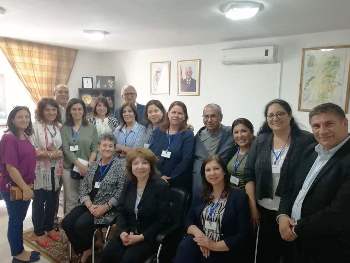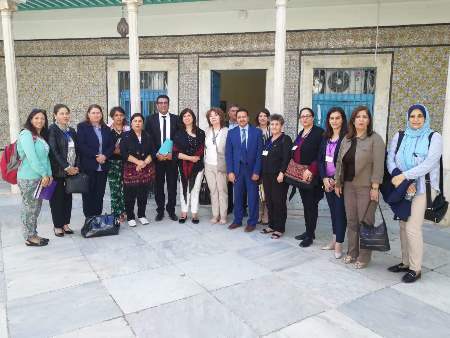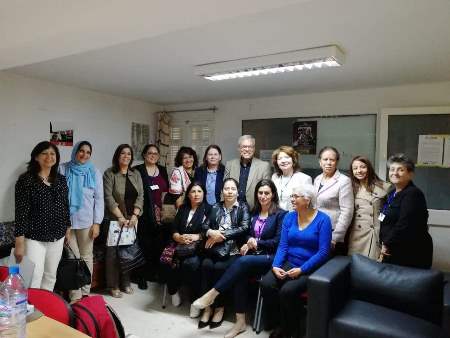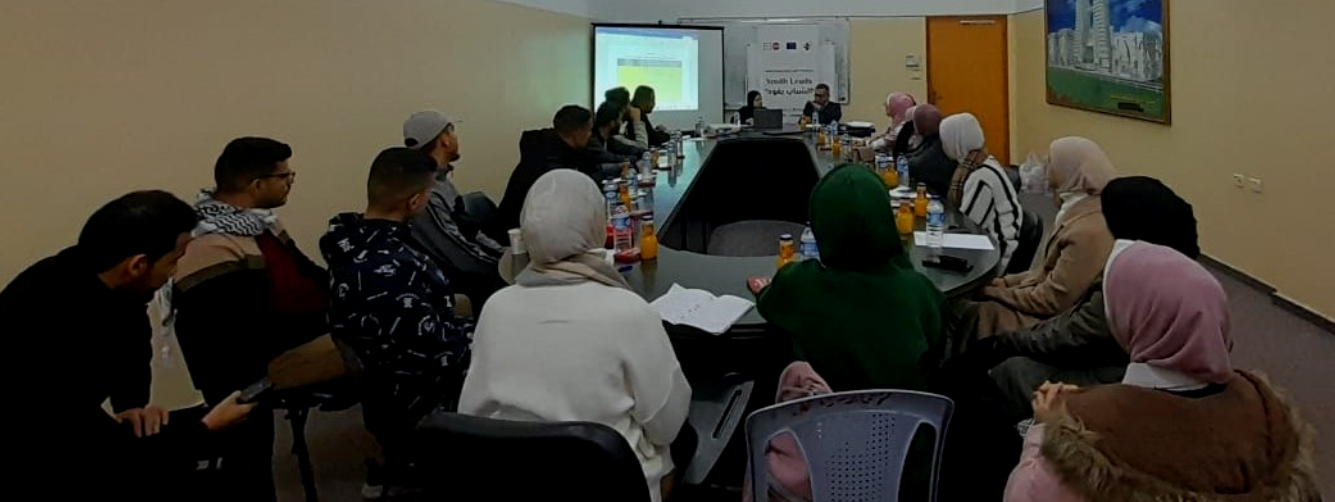
In coordination with the Tunisian Women for Research and Development (AFTURD) and the Embassy of Palestine in Tunis- and with support from the Norwegian Representative Office, MIFTAH recently organized a study tour with a women’s delegation representing the Palestinian women’s movement. It included members of the General Union of the Palestian Women, a representative of the Palestinian constitution committee, Fadwa Barghouthi, civil society representatives, a PLC member, a UNESCO representative, rights activists and legal representatives.
The tour is part of MIFTAH’s interventions for supporting women’s political participation to press for integrating a women’s agenda at the political decision-making level and for developing national and general policies. The tour aimed at briefing the women’s delegation on the development process of drafting and passing of the 2014 constitution in Tunisia.
As part of the visit’s program, the delegation met with representatives from civil society institutions, particularly women’s institutions which played a prominent role in introducing proposals and articles pertaining to equality, discrimination and ending violence against women in the Tunisian constitution. The delegation also met with a number of members of the constituent council of the constitution. They met with the head of the council, members and the special rapporteur for the constitution in addition to a number of academics at College of Legal Sciences. The delegation also had a special meeting with the Deputy Minister for Women’s Affairs and the technical team within this ministry.
The meetings reflected the high level of various expertise and efforts that went into drafting the Tunisian constitution, which showed considerable coordination between civil society components, members of the legal and academic field and political factions. They also showed the key role played by the media in transmitting the constitution drafting sessions from within the constituent council, which were open to the public. This contributed to providing an interactive space between the citizens and the council and reflected elevated social awareness towards the importance of drafting the constitution in Tunisia in a way that preserves the legal and civil rights guaranteed by the 1956 constitution and the personal status law under President Bourguiba. The sessions were also attended by representatives of the social youth movement, which constituted the first spark of the revolution.
The delegation had the opportunity to learn about the tools used to press for integrating the women’s agenda in the constitution. All the parties put forth concerted efforts for presenting draft constitutions according to their own approaches, so as to be considered and have some of their proposals included. Perhaps the most significant role women’s institutions played in this regard was presenting a draft constitution from the perspective of Tunisian women. This resulted in the adoption of two major chapters in the constitution, Chapter 21 and Chapter 46, which addressed the issue of equal rights, obliterating discrimination, achieving harmony, protecting the acquired rights of women and taking the necessary measures to eradicate violence against women.
The women’s delegation showed interest in learning how they could benefit from this unique experience even though the context in which the Tunisian experience took place differs from the Palestinian one. However, they focused on the common components of working towards raising social awareness on the importance of a Palestinian constitution, opening a dialogue on this subject in which all parties and representatives participate, promoting networking and coordination between civil society institutions, creating a women’s consensus on the shape and form of the constitution, either through presenting a draft of the constitution that expresses the vision of Palestinian women, or through seriously reviewing what has been developed and the available drafts of the constitution in a way that would guarantee positive interaction; increasing national and women’s efforts to arrive at a legislative and legal system that guarantees rights and freedoms in Palestinian society.
The significance of this study tour is that it coincides with the efforts to harmonize national laws and legislations with international agreements and resolutions signed by the PA, in addition to the efforts being made by the constitution committee to draw up the constitution, which is the fundamental pillar for protecting freedoms and achieving social justice in a future Palestinian state.

The delegation urged the Palestinian constitution committee to open up to civil society institutions as a necessity for opening the dialogue to various components and sectors of Palestinian society. This, they maintain, is a step that would allow the Palestinian street to be involved in a process to ultimately safeguard the protection of the Palestinian social fabric, freedom of opinion and political pluralism and democracy in Palestinian society.
MIFTAH Political Dialogue and Good Governance Program Director Lamis Hantouli said the visit was one of a series of MIFTAH interventions in supporting and promoting the presence of Palestinian women, whether locally, regionally or internationally. It is also aimed at promoting all efforts to support the participation and representation of Palestinian women at the local and public levels and in the various elected councils, she said. “This visit reflects the continuous support for integrating the Palestinian women’s agenda in legislative and legal frameworks on the basis of equality and justice and reaffirms the rights and resistance-based identity of Palestinian women in institutional, political and resistance arenas, locally and internationally.
Furthermore, MIFTAH’s Projects Manager Najwa Yaghi said MIFTAH would continue its work towards reaching a women’s consensus over the constitution, agreed on by all of Palestine’s women. She said this could be achieved through an approach that juxtaposes the Tunisian experience with the Palestinian context and through building on the women’s document, which includes the legal framework for the social and political agenda of Palestinian women.
A team from the Palestinian embassy accompanied the delegation throughout the duration of the visit, which strengthened the cooperation and interaction between the Palestinians and the various parties they met with.











